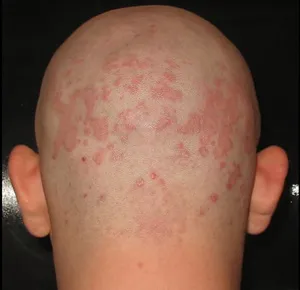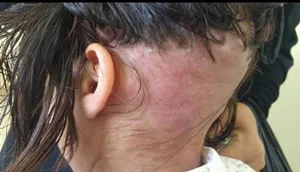
Is Your Female Hair Loss Caused By Systemic Inflammation?
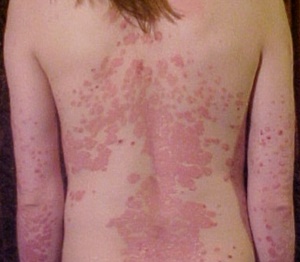 Psoriasis_on_ba ck: User:The Wednesday Island (of the English Wikipedia) derivative work: James Heilman, MD Wikipedia
Psoriasis_on_ba ck: User:The Wednesday Island (of the English Wikipedia) derivative work: James Heilman, MD WikipediaIf you have chronic systemic inflammation, your immune system is constantly in a state of overdrive.
When your immune system is compromised, it may attack healthy cells.
Healthy scalp, roots, and hair follicles may also be targeted by a faulty immune system.
Women's Hair Loss Conditions - Linked To Inflammation
Chronic system inflammation is linked to Alzheimer's, degenerative heart disease, and depression.
Those are just a few related diseases. It's been linked directly to several types of cancers and diabetes.
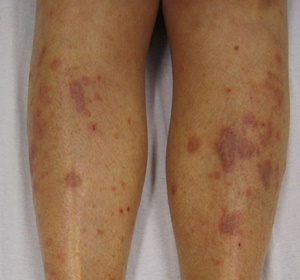 Is Your Female Hair Loss Caused By Systemic Inflammation?
Is Your Female Hair Loss Caused By Systemic Inflammation?Autoimmune system disorders triggered by chronic inflammation have been directly linked to women's hair loss.
This condition is also tied to alopecia areata, Hashimoto's thyroiditis, lichen planus, seborrheic dermatitis, psoriasis, and lupus. Sometimes it is related to telogen effluvium (TE).
Some medications (Levothyroxine) regularly prescribed to treat autoimmune diseases can also lead to hair loss.
Women's Hair Loss Conditions - Toxins Equal Chronic Inflammation
In our current world, there is an escalating epidemic of chronic inflammation which has been triggered by:
- Microplastics, PRAS, and BPAs
- Petrochemicals leached from plastic bottles
- Toxins in nonstick cooking pans.
- Chemicals in food packing
- Artificial flavors and ingredients
- Cleaning products.
- Dishwasher powders that cling to plates and glasses
- Heavy metals. Aluminum, cadmium, and mercury.
- Toxins in antiperspirants, antacids, some types of fish, and dental fillings.
- Products and particulates in city pollution and air.
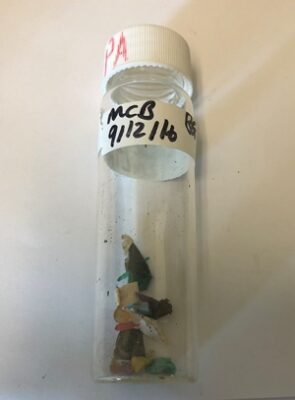 Microplastic Samples - Wikipedia
Microplastic Samples - WikipediaThe Environmental Working Group identified more than 200 chemicals in the umbilical cord blood of newborn babies.
This included endocrine disruptors, pesticides, fertilizers, and more.
Systemic Testing Provides Answers
The best way to determine if you have chronic inflammation is through a series of tests.
Chronic inflammation can be determined by a Mediator Release Test (MRT). This test searches for mediator releases like histamines
Histamines are just one of 80 or more mediators that the bloodstream can release.
You can also be tested for food or chemical sensitivities. Parasites can also play a major part in chronic inflammation. There are tests to determine parasitic infestations.
Parasites are often a trigger for chronic inflammation.
A symptom of inflammation is crippling exhaustion. Obesity is another significant marker is excessive inflammation.
Natural Flavoring In Foods And Drinks Can Trigger Inflammation
 Image - Adrien Ledoux - Unsplash
Image - Adrien Ledoux - UnsplashDue to an FDA loophole, natural flavors are widely used. Added to water, teas, and coffees, they hide toxic stews of chemicals.
They may have no added calories, but they do a lot of damage to the human body.
Unfortunately, natural flavors are everywhere. They are in all types of foods where you might not expect them to be. Read labels carefully.
Natural flavors have become a significant problem by triggering inflammation and hair loss.
Toxic Potential of Natural Flavoring
If you see all-natural flavors listed, be aware of their highly toxic potential.
Not all people react to all natural flavors in the same manner. Some people may have severe reactions; others may not.
Besides triggering hair loss, it may also lead to infertility challenges. It can impact the overall health of millions of young women.
Poor Nutrition Can Fuel Chronic Inflammation But Also Help to Heal It
Toxin-filled diets are well-known for fueling chronic inflammation. That may tip into autoimmune-related hair loss.
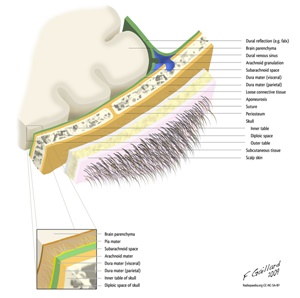 Image of Scalp - Frank Gaillard - Wikipedia
Image of Scalp - Frank Gaillard - WikipediaOn the flip side, changing your food can also help to heal your body.
Detoxification is a significant first step. It must be done carefully and mindfully. Rapid weight loss may trigger telogen effluvium.
When inflammation is correctly addressed, it may help minimize hair loss conditions. When the body heals, so can the scalp, roots, and follicles.
Oxidative Tissue Stress
Excessive inflammation may trigger dangerous reactive oxygen levels. These can encourage rising oxidative stress in tissues.
The immune system naturally produces antioxidant compounds. They help regulate and detoxify reactive oxygen.
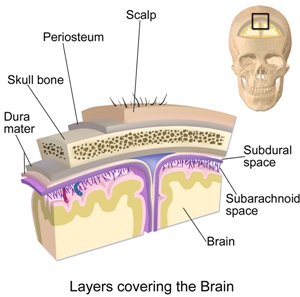 BruceBlaus. When using this image in external sources, it can be cited as: Blausen.com staff (2014). "Medical gallery of Blausen Medical 2014"
BruceBlaus. When using this image in external sources, it can be cited as: Blausen.com staff (2014). "Medical gallery of Blausen Medical 2014"Previous research has found that antioxidant supplementation is effective in:
- Preventing the development of other diseases
- Reducing the prevalence of comorbidities (i.e., obesity, hypertension, or other related conditions).
- Decreasing impact of pro-inflammatory foods.
- Increasing the body's absorption of anti-inflammatory and antioxidant nutrients
This may include Vitamin C, Vitamin E, Curcumin, or Baicalin. Some supplements help reduce infection severity.
Summary - Is Your Female Hair Loss Caused By Systemic Inflammation?
Chronic inflammation remedies are being discovered by scientists. Remedies are now available..
One great first step in healing chronic inflammation is to move from a western diet to a plant-based diet.
A balanced diet, like a Mediterranean food plan, makes a difference. Eating a clean diet improves health outcomes. It may improve overall scalp, root, and hair health. Simple dietary changes may slow or stop related hair loss conditions.
Best wishes to all.Social Media Network Information
Please follow us on Twitter at: https://Twitter.com/HairBoutique. I look forward to meeting new people from all walks of Twitter and learning from their Tweets.


